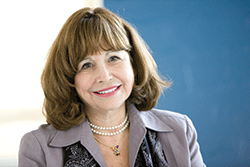The Power of the University-Assisted School
In early April, TC hosted the annual conference of the International Association of Laboratory Schools, a gathering of educators from around the world involved with laboratory and university-affiliated schools. The conference presented an opportunity for us to share information about our university-assisted school – The Teachers College Community School – and to show conference-goers a typically bustling and lively morning at the pre-K to 2 school on Morningside Avenue.
A contingent from the conference toured TCCS on a chilly April morning. The visitors got to see the 1st- and 2nd-grade classes in action, with the students working in groups and independently. They also saw the new library and the demonstration kitchen, as well as specialized art, science and music classrooms. Then they heard from the school’s dynamic principal Jeanene Worrell-Breeden, a veteran New York City school administrator and a TC Cahn Fellow who has created an inclusive culture for the school’s students and active parent community. She described TCCS to the visitors as the culmination of her dream for a true community school.
TC has a long history of university-assisted schools starting with the founding of the Speyer School in Harlem in 1902. We renewed that legacy with the creation of the Office of School and Community Partnerships in 2007, which is headed by Dr. Nancy Streim, Associate Vice President for School and Community Partnerships. Under Dr. Streim’s leadership, we created the REACH (Raising Educational Achievement Coalition of Harlem) partnership of six public schools, which currently includes three elementary schools and three secondary schools. Our goal is to expand the program to include at least 12 schools. REACH leverages the resources of TC and Columbia University to provide comprehensive academic, social, and health services that are critical for children to reach their potential in school.
In 2011, we launched TCCS in partnership with the New York City Department of Education; the school moved to its current location the following year. Today, TCCS anchors our REACH network.
Faculty, students and staff from the College work side by side with Principal Worrell-Breeden and TCCS classroom teachers to create a public school where the emphasis is placed on academic excellence, health and well-being, arts and culture, parent involvement and strong community ties. And by design, the school reflects the dynamic diversity of Harlem.
Our involvement with the school is deep and broad. The TCCS curriculum reflects the input of our faculty who offer their expertise in teaching math, science, music, psychology, nutrition, reading and writing, physical education, art and other areas. Half of the classroom teachers are TC alumni. They are supported by TC pre-service students from many departments, who put into practice pedagogical approaches learned from our faculty.
Our students serve in a variety of other roles as well. They are specialty and pre-service teachers, afterschool instructors, literacy interns and classroom assistants. School psychology interns perform education, psychological and developmental assessments, and provide interventions and counseling on site.
Through our programs in Education, Health and Psychology, we’re setting up referral pipelines for TCCS and our other partnership schools to on-campus clinics and services at Columbia and Teachers College.
TCCS students have been achieving positive outcomes thus far. For example, among kindergarten students, 99 percent completed the 2012-2013 school year at or above grade level in reading and writing. Among first-grade students, 83 percent ended the year at or above grade level in reading and writing. In math, 96 percent of kindergarteners and 90 percent of first-grade students ended the year at or above grade level. Next year, we’ll have the official city test results for third-graders.
TCCS also has received high marks from teachers and parents in a NYC Department of Education’s annual school survey that rates every school on perceptions of academic expectations, communication, engagement and safety and respect.
As TCCS shows much promise to improve student achievement and well-being, we are looking beyond our neighborhood to encourage other universities and their partners across the country to adapt this model for their own public community schools.
Universities are uniquely positioned for this work as longtime neighbors and stable residents of the community. They can contribute leading-edge research and apply their resources in strategic, coordinated and cost-effective ways to foster educational development – and human development, especially for children whose school success is so often compromised by poverty and other challenges.
Philanthropic partners are critical to this endeavor as well. For the university-assisted model to succeed, we must engage and involve them deeply in our work. In fact, we would not have been able to undertake this effort at TC without their vision and generosity. Chief among them have been our Trustees John Rosenwald, Laurie M.Tisch, Enid (“Dinny”) Morse and her husband Lester, Leslie Nelson and her brothers Andrew and Douglas, and Lise Evans, as well as alumna Judith Burger and her husband Robert. The GE Foundation and, more recently, The JP Morgan Chase Foundation have provided very generous support for our REACH partnership schools.
They recognize that all the relevant stakeholders must collaborate to share expertise, research and resources, so that we may have a real and lasting impact on the quality of public education for the next generation – and build stronger communities in the process.
One university-assisted school alone will not transform public education or solve the myriad problems confronting urban public schools throughout the country. But if every university with a school of education and other professional schools were to partner with their local school districts – and in doing so create hubs of academic excellence, professional development and family and community engagement – then we would generate a rising tide of education excellence and opportunity that would lift all boats.Published Monday, Apr. 14, 2014
